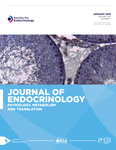- Made available online as an Accepted Preprint 10 July 2009
- Accepted Preprint first posted online on 10 July 2009
High sensitivity of β-cell replication to the inhibitory effects of interleukin-1β: modulation by adenoviral overexpression of IGF2 in rat islets
- 1Laboratory of Diabetes and Experimental Endocrinology, Department of Clinical Sciences, IDIBELL-University of Barcelona, Feixa Llarga s/n 08907 L'Hospitalet de Llobregat, Barcelona,
Spain
2CIBER de Diabetes y Enfermedades Metabólicas Asociadas (CIBERDEM), 08036 Barcelona, Spain
3Endocrine Unit (13-2), IDIBELL-Hospital Universitari Bellvitge, Feixa Llarga, s/n 08907 L'Hospitalet de Llobregat, Barcelona, Spain
- (Correspondence should be addressed to E Montanya at Endocrine Unit (13-2), IDIBELL-Hospital Universitari Bellvitge; Email: montanya{at}ub.edu)
Abstract
Interleukin-1β (IL1B) is an important contributor to the autoimmune destruction of β-cells in type 1 diabetes, and it has been recently related to the development of type 2 diabetes. IGF2 stimulates β-cell proliferation and survival. We have determined the effect of IL1B on β-cell replication, and the potential modulation by IGF2 and glucose. Control-uninfected and adenovirus encoding for IGF2 (Ad-IGF2)-infected rat islets were cultured at 5.5 or 22.2 mmol/l glucose with or without 1, 10, 30, and 50 U/ml of IL1B. β-Cell replication was markedly reduced by 10 U/ml of IL1B and was almost nullified with 30 or 50 U/ml of IL1B. Higher concentrations of IL1B were required to increase β-cell apoptosis. Although IGF2 overexpression had a strong mitogenic effect on β-cells, IGF2 could preserve β-cell proliferation only in islets cultured with 10 U/ml IL1B, and had no effect with 30 and 50 U/ml of IL1B. In contrast, IGF2 overexpression induced a clear protection against IL1B-induced apoptosis, and higher concentrations of the cytokine were needed to increase β-cell apoptosis in Ad-IGF2-infected islets. These results indicate that β-cell replication is highly sensitive to the deleterious effects of the IL1B as shown by the inhibition of replication by relatively low IL1B concentrations, and the almost complete suppression of β-cell replication with high IL1B concentrations. Likewise, the inhibitory effects of IL-β on β-cell replication were not modified by glucose, and were only modestly prevented by IGF2 overexpression, in contrast with the higher protection against IL1B-induced apoptosis afforded by glucose and by IGF2 overexpression.
- Received in final form 27 May 2009
- Accepted 10 July 2009
- © 2009 Society for Endocrinology














